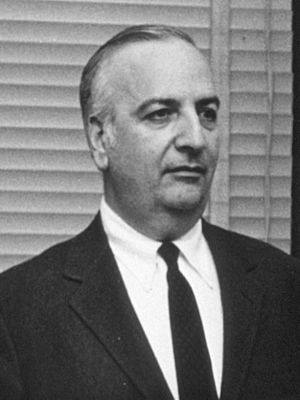Baruj Benacerraf facts for kids
Quick facts for kids
Baruj Benacerraf
|
|
|---|---|

Benacerraf
|
|
| Born | October 29, 1920 Caracas, Venezuela
|
| Died | August 2, 2011 (aged 90) |
| Citizenship | Venezuela/USA |
| Alma mater | |
| Known for | Major histocompatibility complex |
| Spouse(s) |
Annette Dreyfus
(m. 1943; |
| Children | 1 daughter |
| Awards | |
| Scientific career | |
| Fields | Immunology, medicine |
| Institutions |
|
Baruj Benacerraf (born October 29, 1920 – died August 2, 2011) was a scientist who studied the immune system. He was born in Venezuela and later became an American citizen.
In 1980, he won the Nobel Prize in Physiology or Medicine. He shared this important award with two other scientists, Jean Dausset and George Davis Snell. They won for discovering special genes called the major histocompatibility complex. These genes help our immune system tell the difference between our own body's cells and harmful invaders.
Early Life and School
Baruj Benacerraf was born in Caracas, Venezuela, on October 29, 1920. His parents were from Morocco and Algeria. In 1925, his family moved to Paris, France.
Later, in 1940, he moved to the U.S. He went to the Lycée Français de New York. There, he earned a Baccalauréat, which is like a high school diploma in France. This diploma is needed to go to university.
In 1942, he got his first degree from Columbia University. He then wanted to study medicine. It was hard for him to get into medical school because of his Jewish background. But he was accepted at the Medical College of Virginia. Soon after starting medical school, he became a U.S. citizen.
His Amazing Career
After medical school, Baruj Benacerraf worked in the U.S. Army. He also did research in France. From 1948 to 1950, he was a researcher at Columbia University College of Physicians and Surgeons.
He then worked in Paris from 1950 to 1956. After that, he moved to New York University (1956–1968). He also worked at the National Institutes of Health (1968–1970).
In 1970, he joined Harvard University medical school in Boston. He became a professor there. He also worked at the Dana–Farber Cancer Institute.
Benacerraf started studying allergies in 1948. In the 1960s, he found special genes called Ir (immune response) genes. These genes are important for understanding why our bodies sometimes reject transplanted organs. He wrote over 300 books and articles about his research.
At Columbia, he learned a lot about immunology, which is the study of the immune system. He studied how the body reacts to certain things. He also worked in Paris, where he studied how white blood cells in our body's tissues work.
When he returned to the U.S., he started his own lab in New York City. He focused on training new scientists. He also made a big discovery that led to his Nobel Prize. He found that when certain substances (called antigens) were put into animals with similar family backgrounds, they reacted in two ways: some responded, and some did not.
He discovered that certain genes, called immune response genes, controlled these reactions. This discovery helped scientists understand how our genes control how our immune system works.
His discovery is still very important today. Scientists have found more than 30 genes in a group called the major histocompatibility complex. This complex part of our DNA helps control how our immune system responds. This research has also helped us understand diseases like multiple sclerosis and rheumatoid arthritis. These are diseases where the immune system mistakenly attacks the body's own cells.
Awards and Honors
Baruj Benacerraf received many awards for his important work. In 1971, he was chosen as a Fellow of the American Academy of Arts and Sciences.
Some of his other awards include:
- Rous-Whipple Award of the American Association of Pathologists (1985)
- National Medal of Science (1990)
- Gold-Headed Cane Award of the American Association for Investigative Pathology (1996)
- Charles A. Dana Award for pioneering achievements in Health and Education (1996)
He also received many honorary degrees from universities around the world. These degrees recognized his great contributions to science.
Later Years and Death
Baruj Benacerraf published his autobiography in 1998. He passed away on August 2, 2011, in Jamaica Plain, Massachusetts, from pneumonia. His wife, Annette, had passed away two months before him.
His daughter, Beryl Benacerraf, was also a doctor. She taught at Harvard University and worked at important hospitals like Brigham and Women's Hospital and Massachusetts General Hospital.
See also
 In Spanish: Baruj Benacerraf para niños
In Spanish: Baruj Benacerraf para niños
- List of Jewish Nobel laureates
- List of Venezuelans
 | Audre Lorde |
 | John Berry Meachum |
 | Ferdinand Lee Barnett |

